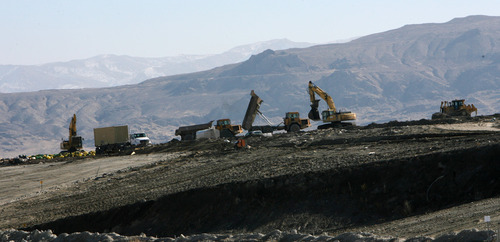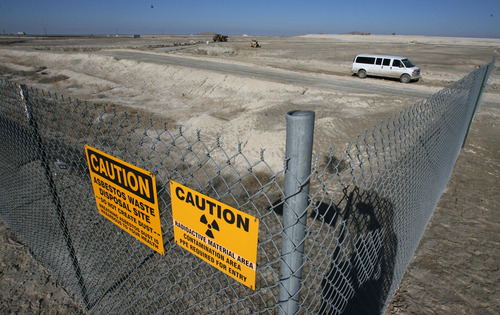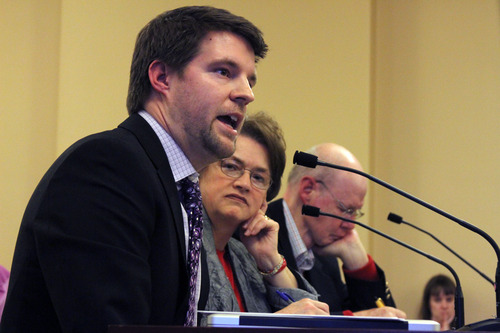This is an archived article that was published on sltrib.com in 2013, and information in the article may be outdated. It is provided only for personal research purposes and may not be reprinted.
EnergySolutions Inc. is morphing once more — this time teaming up with a new private equity firm in hopes of bringing the Salt Lake City company back into private ownership, out of debt and onto the field where nuclear-waste industry's big league plays.
According to the deal announced Monday before the New York markets opened, Energy Capital Partners is set to buy EnergySolutions in a transaction valued at $1.1 billion, with shareholders getting $3.75 in cash for each share of common stock if a better deal does not come before Feb. 6.
EnergySolutions CEO and President David Lockwood said the move offers shareholders "compelling value" and "a substantial premium to our share price over recent months."
"For our company, this transaction enables us to continue to execute on our strategic plan by providing the investment capital to expand and grow our business," he said in a news release.
"As a private company with substantial financial backing," he concluded, "we will be able to better manage our business for the long-term in order to serve the best interests of our customers, employees, joint venture partners and other stakeholders."
In spite of this assertion, no fewer than six legal teams pounced on the announcement to declare they were exploring possible shareholder lawsuits. All questioned whether the company's board had acted improperly by not fetching a better price for shareholders.
EnergySolutions spokesman Mark Walker declined to comment on the threats.
Monday's developments also raised concerns in Utah, where the company owns and operates the nation's busiest disposal site for low-level radioactive waste.
Christopher Thomas, executive director of the Healthy Environment Alliance of Utah, an environmental group and frequent critic of the company, said it is important to remain vigilant.
"We worry that a private equity firm, part of a sector known for typically pushing to aggressively cut costs and grow revenue, may sacrifice safety standards for quick returns on their new investment," he said.
At the Utah Division of Radiation Control, Director Rusty Lundberg said his agency will scrutinize the safety implications of the changes as well as their impact on the company's obligation to maintain financial sureties to cover the costs of closing and later monitoring of the mile-square site.
An audit last fall by the Utah Legislative Auditor General's Office said regulators needed to do a better job of making sure EnergySolutions is following the law and not burying waste that is hotter than the state allows.
But it was not clear what changes, if any, might be in store for the Utah site.
For one, naming-rights for the home of the Utah Jazz basketball team, the EnergySolutions Arena in downtown Salt Lake City, do not expire for another three years.
Energy Capital Partner's Tyler Reeder said his firm, with $7 billion of capital commitments under management, will aid EnergySolutions to expand the company's business worldwide as a subsidiary that will be led by its current management. Energy Capital sees "a tremendous opportunity" to expand the Utah company's U.S. decommissioning and disposal business by partnering with large engineering and construction firms and by continuing the Magnox nuclear site cleanups in Great Britain.
HEAL's Thomas pointed to that comment Monday as a sign that the new EnergySolutions might push to overturn existing restrictions, including a ban on hotter waste and a size limit on the Utah site. The site has accepted more than 96 percent of all the low-level waste that has gone to the nation's commercial landfills in the past two decades.
"EnergySolutions' new owners must realize that what they see as 'tremendous opportunities' often mean bad news for Utah," he said in a news release. "We're determined to not let our state serve as the dumping ground for all of the world's nuclear waste."
Al Kaschalk, an analyst who follows EnergySolutions for Wedbush Securities in Los Angeles, saw some positives in the changes announced Monday. He noted that the private-equity company has a portfolio big enough to back up the nuclear company in its bid for larger projects.
One of them, the decommissioning of the Zion nuclear station north of Chicago, has run into trouble because of the debt load and financing costs associated with doing the $1 billion cleanup.
"That's what EnergySolutions needed," he said, "somebody to help out with the balance sheet"
As Kaschalk noted in a report issued Monday, the deal closes a tumultuous six years for EnergySolutions as a public company.
In June the stock price tumbled from $3.74 per share to $1.62 in a day — the day of the announcement that Lockwood, then the chairman of the board, replaced former President and CEO Val. J. Christensen and brought with him a new CFO.
In the fall, the company laid off 265 of its worldwide employees, with as many as 75 of those in Utah, and scrapped a plan to sell of its European business to cut debt. Then, in November, a $26 million settlement resolved claims the company intentionally misled investors in connection with its 2007 initial public offering of stock at around $21.
Shares (NYSE:ES) closed the day at $2.73, up 8.4 percent from Friday's close.
Twitter: @judyfutah







